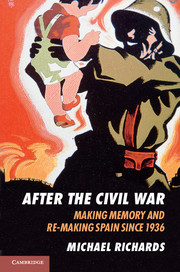Book contents
- Frontmatter
- Contents
- List of maps and tables
- Preface
- Acknowledgements
- Maps
- Introduction: cultural trauma in Spain
- Part I Setting the scene
- 1 War memories since 1936: political, moral, social
- 2 Democracy, civil war, and intimate violence in the 1930s
- Part II Memories of war during the Franco years
- Part III Memories of war after Franco
- Conclusion: the history of war memories in Spain
- Glossary and abbreviations
- Sources and select bibliography
- Index
- References
2 - Democracy, civil war, and intimate violence in the 1930s
Published online by Cambridge University Press: 05 June 2013
- Frontmatter
- Contents
- List of maps and tables
- Preface
- Acknowledgements
- Maps
- Introduction: cultural trauma in Spain
- Part I Setting the scene
- 1 War memories since 1936: political, moral, social
- 2 Democracy, civil war, and intimate violence in the 1930s
- Part II Memories of war during the Franco years
- Part III Memories of war after Franco
- Conclusion: the history of war memories in Spain
- Glossary and abbreviations
- Sources and select bibliography
- Index
- References
Summary
I belong to a generation which has always called itself apolitical, which committed the grave mistake of seeing only the negative aspect of politics, of ignoring the fact that politics could one day become an absolutely essential activity, an activity for our patria, of life and death [. . .] There is nothing strange in the fact that it is a man who is not part of my generation, but of a later one, Doctor Negrín, who today has the glory of interpreting, in the midst of war, the political will of Spain.
Antonio Machado, the Republican poet of the people in the 1930s, born in 1875 and therefore a contemporary of President Manuel Azaña, was requested in September 1938 to comment over wartime national radio on the thirteen-point programme for peace devised by the prime minister, Juan Negrín, the consummate political pragmatist of the 1930s, born in 1892, the same year as Francisco Franco. Machado's words were prophetic, pronounced just a few months before his death in exile in February 1939 and the Republic’s defeat. The apoliticism before 1936 to which he referred in 1938 had been based on republicanism's intellectual bent and Machado's own tacit rejection of Spanish politics, his civic critique of a political life which he perceived as revolving around mere clientelism and the naked struggle for power rather than consent. Machado's creative sense of what politics ought to be would make his ideas important again in the 1970s, during the expansion of civil society which accompanied post-Franco democratisation, but as the war drew to an end he could only regret bitterly that the country had proved to be ‘a land of lamentable negligence’, of political failure, leading to catastrophe.
- Type
- Chapter
- Information
- After the Civil WarMaking Memory and Re-Making Spain since 1936, pp. 34 - 66Publisher: Cambridge University PressPrint publication year: 2013

